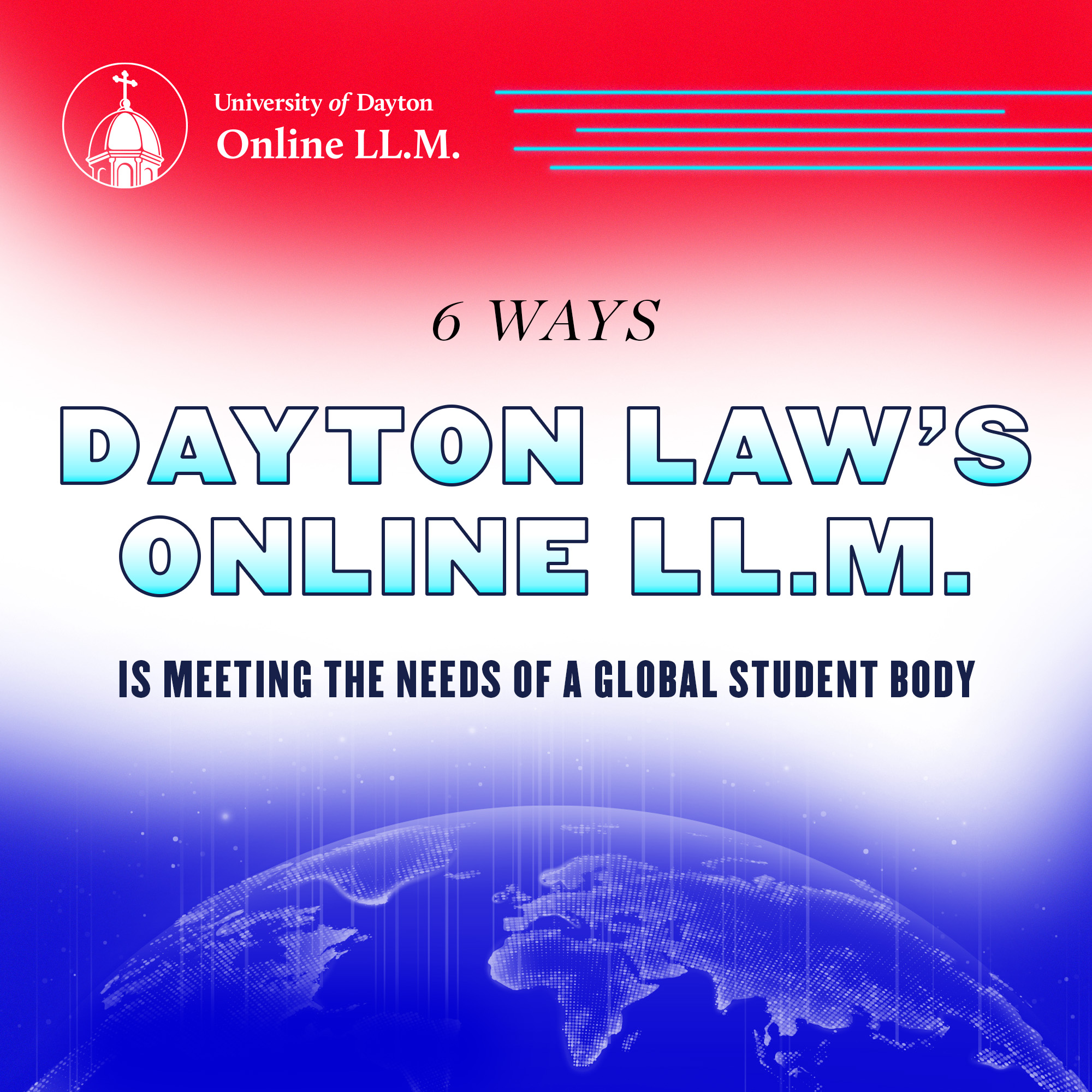Dayton Docket

6 Ways Dayton Law’s Online LL.M. Is Meeting The Needs Of A Global Student Body
Obtaining an online LL.M. is accessible, affordable, and practical. At the University of Dayton School of Law (UDSL), it’s also personal.
We understand not only what makes an online LL.M. program successful, but also what international attorneys need in order to establish a path to bar eligibility and thrive in the U.S. and global legal landscape. Intentionally designed as a fully online program for foreign-educated and non-native English-speaking law school graduates, Dayton Law’s online LL.M. offers the flexibility of remote instruction combined with individualized attention, robust student support, thoughtful instructional design, an optimized use of technology, and partnerships with leading global universities. Significantly, our students master content taught by legal scholars and industry experts. They also receive personalized support and skills training, actively engaging with each other to build networks that will serve them throughout their careers and contribute to their professional growth.
Here are six essential ways that Dayton Law’s online program is prioritizing personal attention and active learning to internationalize legal education and expand opportunities for foreign-trained attorneys to practice in the U.S. or to engage with U.S. law in their jurisdictions.
1. Commitment to Academic Success & Engagement
At UDSL, we are proud to have Nancy Levitin, partner at New York’s Abrams Fensterman LLP, as our dedicated professor of academic success. Professor Levitin works one-on-one with students, providing personalized support, skills training, and coaching. She also organizes interactive workshops and presentations throughout the semester—such as Mock Trials, Mock Interviews, and Student Mixers—giving students opportunities to network with each other while developing capabilities crucial to working within the U.S. legal system.
Additionally, program director Margaret Ioannides is a consistent touchpoint for students throughout their course of studies, advising them on curriculum, bar exam preparation, and job opportunities. Prior to joining Dayton Law, Ms. Ioannides practiced in the field of Immigration Law, worked with the U.S. Department of Justice as an Attorney Advisor, and served as a law school dean and professor.
2. Focus on Live Events & Active Learning
Because Dayton Law professors enrich their asynchronous online curriculum with optional weekly live events, students actively engage in their learning during every course they take. Each semester-long course includes four one-hour live sessions, allowing for questions and fostering robust discussion among students and their professors. Additionally, all faculty members hold weekly office hours and are available to mentor students.
3. Exclusive Access to Thought Leaders & Global Experts
Our webinars with esteemed faculty from Dayton Law and partner universities around the world expand on course content and offer students mentorship opportunities and an insider’s access to new and expanding areas of law—and the relevant job opportunities. The High Tech in High Demand webinar series, for example, addressed emerging global trends in law and technology from data science to digital inequalities to cryptocurrency. The Law in The Americas webinar series showcased transnational and comparative legal issues and was curated by UDSL professor Carlos Bernal—a renowned human rights expert and the world’s most cited scholar in legal theory and the fourth most cited scholar in comparative constitutional law.
4. Extensive Career Services and Bar Support
UDSL is committed to graduates’ long-term success, providing a host of support services at no additional cost. Students meet one-on-one with Director of Career Services Tim Swensen, who provides customized guidance and introduces students to Dayton Law alumni in relevant practice areas and geographic regions. The Career Services Office prepares students for interviews, reviews resumes and cover letters, and helps students target potential employers. Dayton Law graduates qualify for reduced rates for the Themis LL.M. Advantage bar prep course and also have the opportunity for one-on-one bar counseling with members of the LL.M. team.
5. Insider Insights from Alumni
We understand the value of connecting our students with other foreign-trained attorneys practicing in the U.S. All of our UDSL online students are able to confer with Brazilian attorney and Dayton alumna Monica Hayes, LL.M ‘19, who is currently AVP General Counsel at global investment bank Credit Suisse. She generously shares observations about the bar exam, tips about the job search process, and advice about maximizing online learning. Dayton’s online LL.M. program, says Hayes, “was a vital tool that helped me succeed on my path to pass the bar exam and, more importantly, to expand my knowledge of the U.S. legal system, enabling me to thrive in the professional landscape here.”
6. Unique Networking Opportunities
Dayton Law’s online students and graduates have the opportunity to participate in noteworthy University of Dayton networking and academic events. Examples include:
- The Annual Program in Law and Technology (PILT) Seminar, Plenary “Does the Constitution Permit Dual Protection Under Design Patent and Trade Dress for the Same Subject Matter”
- The Gilvary Symposium, “Constitutional Rights, Artificial Intelligence and the Metaverse”
- The Education Law Symposium, “Lemon at 50: Has the Supreme Court Soured on Its Bitter Fruits”
- The Social Practice of Human Rights Conference, “Between Peril and Potential”
With over 90 students hailing from more than 30 countries, a faculty that includes practicing attorneys, legal scholars, a judge, a magistrate, and partner institutions spanning the globe, the Dayton Law community is both close-knit and diverse—supportive of each student’s individual needs.
Find more information about the University of Dayton’s Online LL.M. degree here.
Explore all of UDSL’s webinars covering constitutional law, job search strategies, bar preparation, and more.
